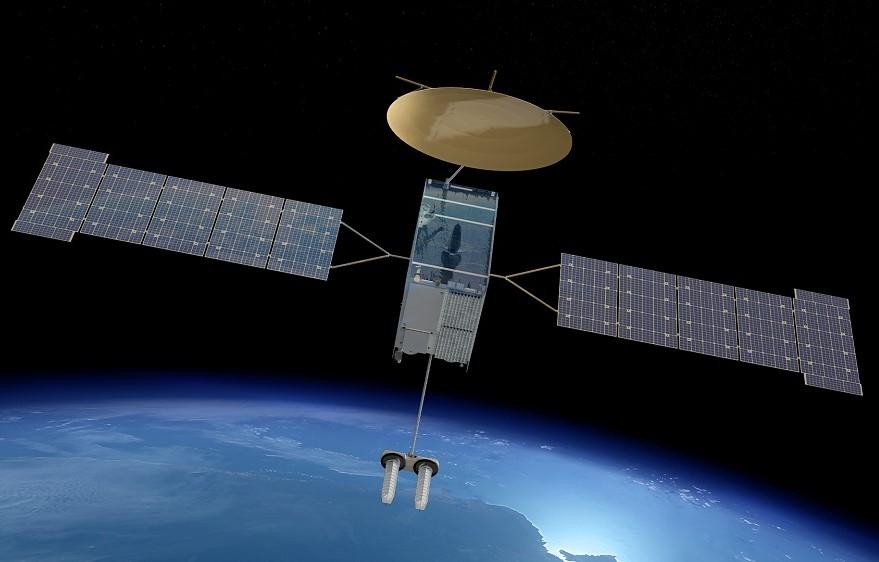ADF a step closer to state-of-the-art satellite system
Posted By Malcolm Davis on April 6, 2023 @ 06:00

After a very long wait—and with the defence strategic review to be released this month—the Australian government has named [1] Lockheed Martin as the preferred tenderer for one of its most important space projects. JP9102 will deliver next-generation sovereign satellite communications for the Australian Defence Force.
At least two, and up to four, large military communication satellites will be deployed in geosynchronous orbit (GEO) 36,500 kilometres above the earth, supported by ground stations and other infrastructure. The preferred tenderer is required to collaborate with local small and medium-sized enterprises on the project. Lockheed Martin says [2] it will work with a diverse team of Australian space and defence-related companies supporting the ground and control segments. The project will be headquartered [3] in Victoria and is expected to create more than 200 space industry jobs.
The Lockheed Martin system will comprise the satellites, to be controlled and operated by the Defence Department; multiple ground stations, including two new satellite communications operations centres; and an integrated management system.
This will transform ADF communications, with the satellites providing high-bandwidth, high-speed digital connectivity across a vast region, from the central Indian Ocean to Solomon Islands, and from the Arctic to the Antarctic. This coverage will provide ADF operations across much of the Indo-Pacific region with robust command-and-control networks. Initial operating capability is due to be achieved in 2027, as the ADF transitions from the Wideband Global Satcom [4] system it shares with the US.
It’s crucial that the satellites are resilient [5] against counterspace systems, including uplink and downlink jamming and cyberattack, as well as natural hazards such as space weather. The large satellites at the project’s core need to be seen as the beginning of a transition to resilient space capabilities for the ADF.
A follow-on capability using small satellites in low-earth orbit (LEO) is the logical next step. Space is highly contested, and the large JP9102 satellites in GEO must be complemented by constellations of small satellites in LEO. The ‘small and the many’ provide enhanced survivability, making it more difficult for an adversary to attack ADF communications and trigger a systems collapse. Small satellites don’t have the same capacity as a larger GEO-based satellite, but their greater number offers advantages, particularly in the rapid relay of information.
It is therefore interesting that Defence has issued a tender for a ‘space-based data transport and relay network [6] … envisioned to be a flexible and configurable global converged network in space’. It is intended to be ‘resilient, enabling secure and rapid transmission and reception of multiple data types through an open systems architecture of satellites and ground assets’.
In adding a resilient network of small satellites, this will complement the large JP9102 satellites to provide global communications for ADF units on operations. The network should be scalable, rapidly deployable and able to be quickly replaced.
To improve resilience, the ADF will need complementary capabilities at LEO and GEO. The data transport and relay network, based on small satellite technologies, can more deeply leverage the contributions of Australian small to medium-sized companies, in terms of satellite development and construction and sovereign space launch, to ensure rapid replacement of lost capability in a crisis.
The JP9102 satellites may, if they are based on open-architecture design or software-based systems, take advantage of future on-orbit servicing technologies that could extend their operational life and enhance their capabilities over time. Lockheed Martin has hinted [7] at this kind of approach with its ASPIN interface, which has an open standard and supports third-party development of supplementary mission systems for use in orbit.
The company, its Australian commercial collaborators, and Defence have a golden opportunity to adopt a new paradigm for future space capability. Rather than seeing large GEO-based satellites as a capability that, once deployed, can’t be enhanced to keep pace with technological innovation, JP9102 gives Australian commercial space companies the opportunity to embrace the next generation of in-orbit capabilities for satellite servicing. Lockheed Martin, Defence and the commercial space sector need to be innovative and bold in their thinking, both with the GEO satellites and by embracing small satellites in LEO to enhance resilience.
The JP9102 selection provides a moment where Defence, together with the Australian Space Agency, must firmly open the door to a larger role for Australia’s commercial space sector—much more than just supporting an overseas prime. To treat this as a traditional large defence project could represent a missed opportunity for Australia to demonstrate a true Space 3.0 paradigm [8] delivering new defence capabilities rapidly and sustaining and enhancing the JP9102 capability in innovative ways that maximise resilience.
Article printed from The Strategist: https://aspistrategist.ru
URL to article: /adf-a-step-closer-to-state-of-the-art-satellite-system/
URLs in this post:
[1] named: https://www.defence.gov.au/news-events/releases/2023-04-03/lockheed-martin-deliver-defence-satellite-communication-system
[2] says: https://lockheedmartinau.mediaroom.com/index.php?s=2429&item=122648&linkId=100000197467965
[3] headquartered: https://lockheedmartinau.mediaroom.com/index.php?s=2429&item=122640
[4] Wideband Global Satcom: https://www.everythingrf.com/community/what-is-wideband-global-satcom
[5] resilient: https://www.australiandefence.com.au/defence/cyber-space/a-closer-look-at-jp-9102
[6] data transport and relay network: https://www.tenders.gov.au/Atm/ShowClosed/592650b4-4927-4729-949e-ea71c1a61280?PreviewMode=False
[7] hinted: https://news.lockheedmartin.com/2022-02-25-Lockheed-Martin-Releases-Open-Source-Interface-Standard-for-On-Orbit-Docking
[8] Space 3.0 paradigm: /towards-space-3-0/
Click here to print.